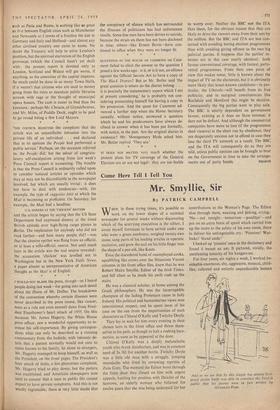IT DOES NOT MATTER very much whether the present plans
for TV coverage of the General Election are or are not legal : they are too feeble to worry over. Neither the BBC nor the ITA likes them, for the obvious reason that they are likely to drive the viewers away from their sets by the million. But the BBC and ITA are less con- cerned with avoiding boring election programmes than with avoiding giving offence to the two big political parties. It happens that the parties' in- terests are in this case nearly identical : both favour conventional coverage, with formal, party- vetted programmes. From their own point of view this makes sense; little is known about the impact of TV on the electorate, but it is obviously more likely that lesser-known candidates—in par- ticular, the Liberals—will benefit from its free publicity; and in marginal constituencies like Rochdale and Hereford this might be decisive. Consequently the big parties want to play safe. The BBC is utterly dependent on government favour, existing as it does on State revenue; it dare not be defiant. And although the commercial companies have more to lose (if the programmes shed viewers) in the short run by obedience, they are desperately anxious not to offend in case they lose the third TV network as a result. The BBC and the ITA will consequently do as they are told, unless public opinion can be brought to bear on the Government in time to take the arrange-






































 Previous page
Previous page